Robert Fulghum leapt upon the national scene with his wildly popular collection of our generation’s wisdom literature, “All I Really Need to Know I Learned in Kindergarten: Uncommon Thoughts on Common Things.”
Fulghum’s gift has been to drink in the world as it comes to us, analyzing day-to-day observances and events to help us see goodness, mystery and marvel in them.
If there’s brilliance in being able to open one’s eyes and see clearly, Fulghum’s vision is 20/20.
Over the years, I’ve come to love and respect his wholesome approach to life and faith and what I would call “a holy reverence and observation” about life.
Fulghum grew up in Waco, Texas, and escaped by his own wits in avoiding becoming a Baptist. That’s a modern-day miracle don’t you think?
Waco’s surely the most Baptist city in America with more Baptist churches there per capita than any place on the face of the earth.
Not only that, but Fulghum also served as a Unitarian minister before he became rich through his books.
I like what he has to say and value his ability to capture life and faith in his quirky view of the world.
One of the best things he’s written in my estimation is “From Beginning to End: The Rituals of Our Lives.”
This book is near holy in its savoring of the rituals that define our lives from birth to death.
It would make for a smart discussion book for a group that wants a stimulating read to help the group members tell their stories to one another as an act of communion over their shared lives.
But I think I may have bitten off more than I can chew with Fulghum’s publication of “Third Wish.” It’s a five-volume book in two bindings held together in a hardcover box set.
I lifted the first book, which includes the first two volumes, and discovered I could do arm curls with it, as it was heavy and taxing.
French novelist Marcel Proust, whose lengthy novel, “In Search of Lost Time,” was published in seven volumes between 1913 and 1927, would smile in envy at the audacity and ambition of it.
On the backside of the box, I ran across a quote from Alexandros Evangelou Xenopouloudakis titled “Instructions for Wayfarers” that I thought was worth passing along.
For accuracy, I looked up the word “wayfarer” and half expected to see a small photo of Tom Cruise in his Ray-Bans and boxers; instead, here’s what the dictionary says it means: “One who travels, esp. on foot.”
Wayfarers aren’t all that common these days. We drive our car across the parking lot to get closer to the next store on the same block.
The loss of our car to the repair shop for even one day is like an amputation, for goodness’ sakes.
Back to Xenopouloudakis, whose poetic quote reads like ancient wisdom itself:
They will declare: Every journey has been taken.
You shall respond: I have not been to see myself.
They will insist: Everything has been spoken.
You shall reply: I have not had my say.
They will tell you: Everything has been done.
You shall reply: My way is not complete.
You are warned: Any way is long, any way is hard.
Fear not, you are the gate – you, the gatekeeper.
And you shall go through and on …
Thanks, brother Fulghum, for stirring the pot of ideas and keeping us on our toes to the liveliness of the world at hand.
 Keith Herron is pastor of Holmeswood Baptist Church in Kansas City, Mo., and a member of the board of directors for the Baptist Center for Ethics. His sermons appear on EthicsDaily.com.
Keith Herron is pastor of Holmeswood Baptist Church in Kansas City, Mo., and a member of the board of directors for the Baptist Center for Ethics. His sermons appear on EthicsDaily.com.

